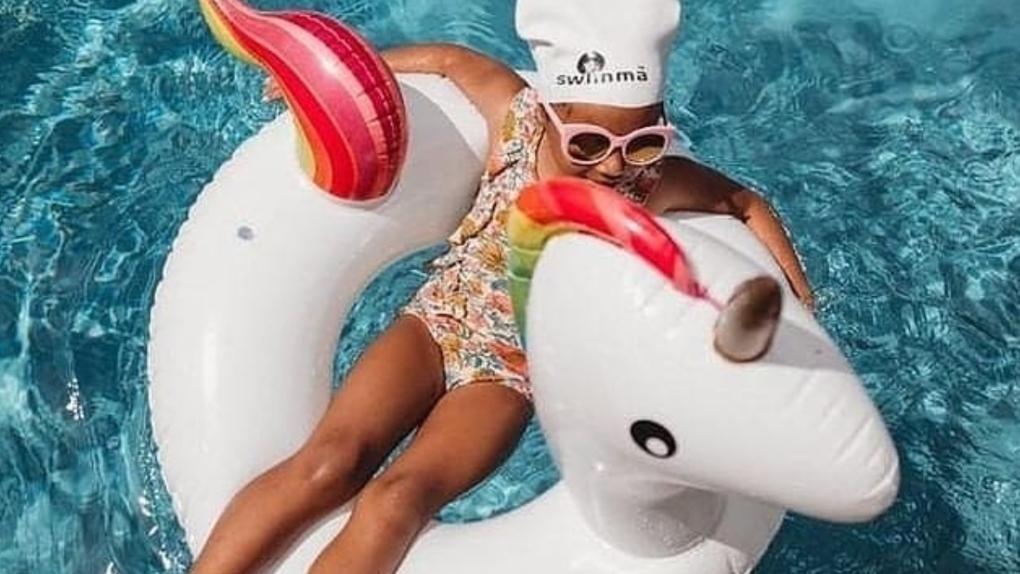Olympics’ ban on swim caps for natural Black hair is causing barriers, Ontario business owner says
The backlash surrounding a controversial policy to ban swim caps for natural Black hair is growing across the world.
Kim West owns an Ajax-based company called Kids Swag. She said her mission is to boost self-confidence in kids.
When it comes to swimming, West said some of her Black customers have shared their uncomfortable experiences wearing the traditional swim cap.
“I’ve had customers that would reach out and share stories where they were saying, ‘I remember swimming and the cap popping off and it floating in the water,’” she said.
When West first started selling Swimma Caps — a cap created by a woman in South Africa meant to protect dreadlocks, braids, and Afro hairstyles — the demand exceeded her supply.
“It sold out within three days,” she said.
The Fédération Internationale De Natation (FINA), which is the international governing board of swimming, banned the British brand Soul Cap at the upcoming Tokyo Olympics, because the cap doesn’t follow “the natural form of the head.”
West says the language used in the new policy is concerning.
 Woman swimming while wearing a "Swimma Cap" specially designed for natural Black hair. (Kim West)
Woman swimming while wearing a "Swimma Cap" specially designed for natural Black hair. (Kim West)
“What does that mean? I think we really have to continually stop and say these words ‘normal’ and ‘standard.’ What is it connoting? What are we really talking about?” she asked.
University of Guelph head swim coach, Chantique Carey-Payne, told CTV News Toronto that the ban “shows how lacking FINA still is in undemanding issues that surround the BIPOC community.”
“I remember seeing it and being completely shocked to be honest,” she said.
She said she used to have long braids, but cut them off.
“Wearing a cap was so hard because I broke them all the time and eventually I made the decision to get rid of the braids,” she said.
The ban goes beyond the Olympics, she said, and it could impact kids as young as 10-years-old.
“Those rules apply for national swim meets, but also provincial swim meets, regional swim meets and invitationals. So, we’re not only talking about the top one per cent of the best swimmers in the world,” she said.

Since 2007, Carey-Payne says she’s only seen four Black swimmers – including herself – at the university.
Some argue that not only does the cap not provide a competitive edge, but it also adds more resistance.
FINA has since said it would review the ban.
“The swim caps have become just so popular with everyone that has come across it,” West said.
“I think it signifies a huge gap that exists in the marketplace.“
CTVNews.ca Top Stories

W5 Investigates 'I never took part in beheadings': Canadian ISIS sniper has warning about future of terror group
An admitted Canadian ISIS sniper held in one of northeast Syria’s highest-security prisons has issued a stark warning about the potential resurgence of the terror group.
Trudeau talks border, trade in surprise dinner with Trump at Mar-a-Lago
Prime Minister Justin Trudeau discussed border security and trade during a surprise dinner with U.S.-president elect Donald Trump at Mar-a-Lago in West Palm Beach, Fla. on Friday evening, according to senior government sources.
Are scented candles bad for you? What the science says
Concerns about the safety of candles are rooted in the chemical reactions that occur when you burn them, as well as in the artificial fragrances and colorants that contribute to the various scents you may love.
Magic can't save 'Harry Potter' star Rupert Grint from a US$2.3 million tax bill
Former 'Harry Potter' film actor Rupert Grint faces a 1.8 million-pound (US$2.3 million) bill after he lost a legal battle with the tax authorities.
Postal workers union files unfair labour practice complaint over Canada Post layoffs
The union representing Canada Post workers has filed an unfair labour practice complaint with the Canada Industrial Relations Board over the layoffs of striking employees.
'Absolutely been a success': Responders looks back at 988, Canada's Suicide Crisis Helpline, one year later
In its first year, responders for Canada's Suicide Crisis Helpline, known as 988, have answered more than 300,000 calls and texts in communities nationwide.
Indonesian fishermen rescue 116 Rohingya refugees
Indonesian fishermen on Saturday rescued 116 Rohingya refugees, mostly hungry and weak women and children, after their rickety boat sank, officials said.
From inside a Cameroon jail, gay youth say police exploit homophobia to seek bribes
Cameroon's penal code criminalizes 'sexual relations with a person of the same sex,' with a maximum sentence of five years in prison and a $450 fine.
Face facts: Statues of stars like Kane and Ronaldo don't always deliver. Sculptors offer advice
One art critic compared the new Harry Kane bronze statue to a bulging-jawed comic strip character.


































